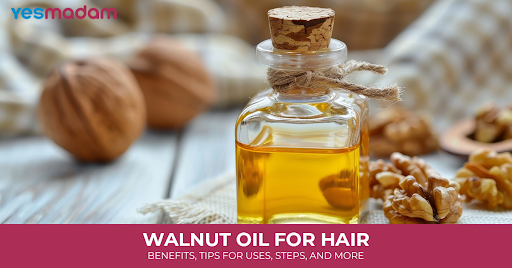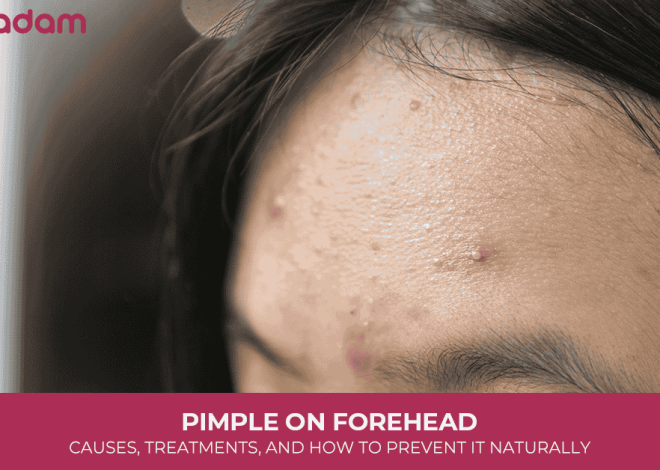
Walnut Oil for Hair: Benefits, Tips for Uses, Steps, and More
Looking for a natural remedy to manage common hair problems? Walnut oil is a powerhouse of nutrients and vitamins, providing a simple yet effective solution for treating common hair troubles like hair loss, dryness, and dullness.
In this blog on walnut oil for hair, you will get to know how this versatile oil can work wonderfully for your hair and also some of its interesting DIY uses.
Table of Contents
Walnut Oil for Hair: What It Is and How to Use It?

Facing hair issues has become quite common nowadays. Whether it is hair thinning, hair loss, or dandruff, these problems are endless. While there are many over -the -counter products that can help tackle hair fall effectively. Nothing can beat the deep moisturizing and nourishing properties of walnut oil to boost overall hair health.
Walnut oil is a natural solution to stop hair fall and promote hair growth. It is a rich source of omega-3 fatty acids and therefore, helps to stop cell damage, thus preventing the hair strands from falling off.
How To Make Walnut Oil for Hair? Key Steps to Follow
Walnut, as a dry fruit, is not just great for your overall health, but for your hair too. The following is a step-by-step guide on how to extract walnut oil for hair:
- Bring a certain quantity of water to a boil. After that, pour all the walnuts into the water and let them boil for 10 minutes.
- Now, extract the walnuts and let them cool completely.
- After that, grind and crush the walnuts into a fine powder.
- Add this powder to a vegetable oil.
- The oil is regarded as ready to use once it changes colour.
- Apply this oil at least 2-3 times a week and then rinse off using a mild shampoo.
Walnut Oil Benefits for Hair

Walnut oil is rich in omega-3 fatty acids, biotin, and potassium, which nourish the hair, strengthen follicles, and encourage new hair growth.
Here’s a more detailed look at the walnut hair oil benefits:
Promotes Hair Growth: Walnut oil’s omega-3 fatty acids and potassium are known to stimulate hair follicles and encourage new hair growth, potentially increasing hair volume and thickness, according to health articles.
Reduces Hair Fall: The oil’s nourishing properties, particularly its omega-3 fatty acids, help strengthen hair from the root, reducing breakage and hair fall.
Improves Scalp Health: Walnut oil’s anti-inflammatory and anti-fungal properties can help soothe an irritated scalp, reduce dandruff, and create a healthier environment for hair growth.
Moisturizes and Conditions: Its rich texture and moisturizing properties help hydrate dry and brittle hair, making it softer, smoother, and more manageable.
Adds Shine and Luster: Regular use of walnut oil can enhance the natural shine and luster of hair, making it look healthier and more vibrant.
Repairs Damage: The oil’s nutrients can help repair damaged hair follicles and protect against further damage from environmental stressors.
May Darken Hair: Some users report that walnut oil can darken light hair, adding a warm, reddish hue.
How to Use Walnut Oil for Hair:
Massage: Gently massage walnut oil into your scalp to improve circulation and nourish the roots.
Hair Mask: Apply walnut oil to your hair, from root to tip, and let it sit for a desired amount of time (e.g., 30 minutes) before washing it off.
Leave-in Conditioner: Apply a few drops of walnut oil to damp hair as a leave-in conditioner to add shine and manage frizz.
Step-by-Step Guide to Use Walnut Oil for Hair Regrowth
Walnut oil scalp massage is the right method of applying walnut oil in your hair care treatment, especially to address the issue of hair thinning and promote hair regrowth. The steps include :
Warm the oil: Warm 2-3 tablespoons of walnut oil using a microwave or normal heating methods.
Massage: Now, part your hair into sections and apply the warm oil directly to the scalp with your fingertips.
Leave it on: Let the oil remain on hair for at least 30 minutes or overnight to produce better results.
Rinse: Apply enough shampoo to remove the oil from your hair. Keep massaging in circular motions for about 10-15 minutes.
DIY Uses of Walnut Oil for Hair

Here is a table outlining the best DIY uses of walnut oil for hair, with benefits and how-to use tips :
| DIY Method | Benefit | How to use |
| Warm oil massage | Improves circulation, promotes hair health. | Warm the oil, then gently massage it into your scalp with your fingertips in circular motions. |
| Hair mask | Adds strength to weak hair and also shine. | Mix the oil with other nourishing ingredients. Apply to hair and rinse off with a gentle shampoo. |
| Overnight hair treatment | Boosts hair shaft, deep conditioning. | Slightly warm the walnut oil and massage it on the scalp and hair. Leave overnight. |
| Split end repair serum | Seals split ends, adds shine and smoothness. | Apply 2-3 drops of walnut oil to towel-dried ends post-shower. |
| Leave-in conditioner | Controls frizz, acts as a protective layer. | Rub 1-2 drops between palms and apply over damp or dry hair. |
More Information For You: Almond Oil Benefits for Skin
Conclusion
The blog on walnut oil for hair has successfully shown how this oil makes your hair shinier, longer, and stronger. Follow the application tips to get the most out of walnut oil for hair growth. Do a patch test before applying the oil to your hair to prevent an allergic reaction.
Consistency is important, whether you apply this versatile oil as a hair mask or as a leave-in conditioner, to nourish the hair and stimulate hair growth. For better effect, you can include walnut oil in your diet, which will help nourish your hair from within, and mix it with other nourishing oils and ingredients to reap the full benefits.
FAQs
Is walnut oil good for hair?
Yes, walnut oil is usually good for hair. It contains omega-3 fatty acids, nutrients, and other antioxidants to strengthen and nourish hair.
What are the benefits of black walnut oil for hair?
Black walnut oil can help nourish and moisturize dry or damaged hair, promote hair growth, minimize hair loss, and improve scalp health.
Which is better, almond or walnut oil for hair growth?
Both almond and walnut oil are beneficial for hair growth, but they offer slightly different benefits. Almond oil is good for deep conditioning, while walnut oil is good for promoting faster hair growth.
What are the side effects of applying walnut oil to hair?
Although safe for hair, it may cause allergic reactions on the scalp due to nut allergies. So, a patch test is recommended before you apply.
Can we use walnut oil daily on hair?
Yes, walnut oil can be used on hair daily, but in small amounts, to avoid making it appear greasy.
Does walnut oil darken hair?
Yes, walnut oil can darken hair due to natural compounds found in walnuts, such as tannins and propehynols, which react with hair proteins to subtly darken them.
Can I leave walnut oil in my hair?
Yes, you can leave walnut oil in your hair, but it’s usually recommended to leave it on for 30 minutes to overnight before rinsing off.
Can walnut oil stop hair fall?
Yes, walnut oil is effective in reducing hair fall and promoting healthy hair growth due to its rich nutritional content.
Is walnut oil good for dry scalp?
Yes, walnut oil is good for dry scalp due to its moisturizing and anti-inflammatory properties.
Is walnut oil good for the scalp?
Yes, walnut oil is good for the scalp. It is enriched with omega-3 fatty acids, antioxidants, and vitamins to nourish the scalp and promote hair growth.



